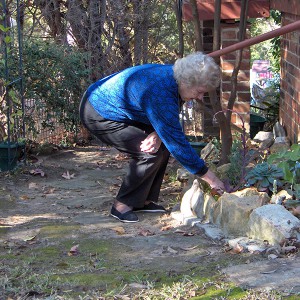 ‘Bend ze knees’ takes on a new meaning in helping to reduce falls in the elderly. Lifestyle interventions like this are more beneficial than structured exercise programs in reducing falls in the over 65s, according to researchers at the University of Sydney. Home-based interventions such as balancing on one leg to brush teeth, bending over when gardening or walking sideways when hanging out the washing has been shown to reduce falls by more than 30 per cent for those over 65 who have had a fall before.
‘Bend ze knees’ takes on a new meaning in helping to reduce falls in the elderly. Lifestyle interventions like this are more beneficial than structured exercise programs in reducing falls in the over 65s, according to researchers at the University of Sydney. Home-based interventions such as balancing on one leg to brush teeth, bending over when gardening or walking sideways when hanging out the washing has been shown to reduce falls by more than 30 per cent for those over 65 who have had a fall before.
Incorporating balance and strength training in everyday activities and daily routines was found to be more successful than structured exercise and with better adherence, said lead researcher, Professor Lindy Clemson from the Faculty of Health Sciences.
“It is well known that improving balance and strength can prevent falls in older adults, but less than 10 per cent regularly engage in any kind of strength training and balance is even less understood,” she said. “What makes our program different is that we encourage people to get creative and do balance and lower limb strength activities whenever the opportunity arises throughout their day.”
This innovative and non-traditional exercise approach is part of the Lifestyle-Integrated Functional Exercise (LiFE) program launched by the university. In a world-first study, 317 men and women over the age of 70, who were living at home and had suffered two or more falls in the past year were recruited. Researchers compared those participating in the LiFE program to a control group doing a gentle placebo exercise programs three days a week, and a third group who did traditional balance and strength exercises three times a week. The researchers found a 31 per cent reduction in the rate of falls for participants in the LiFE program compared with the control group. LiFE participants also showed improvements in static and dynamic balance, ankle strength, function and participation in daily life, suggesting the program improves both fall risk and frailty. The results will be helpful for occupational therapists and physiotherapists with patients wanting support to participate in the program.
Professor Clemson said adopting the program will ultimately increase people’s independence by allowing them to stay mobile and live in their homes for longer.
LiFE balance and strength training strategies:
- Tandem walking down a hallway
- One leg standing while at the kitchen or ironing
- Lean to one side as far as possible when cleaning teeth
- Bend the knees to pick up something or stack the dishwasher
- Lean back on heels when placing items on a high shelf or watering the garden
- Walk sideways when setting or clearing the table or hanging out washing
Fast Facts on Falls:
- One in three people aged over 65 suffer a fall each year
- If you have a fall you are more likely to have another
- Each year over 80,000 older people are hospitalised as a result of a fall
- Many falls can be prevented
For more information or to order LiFE manuals visit: http://sydney.edu.au/sup/
